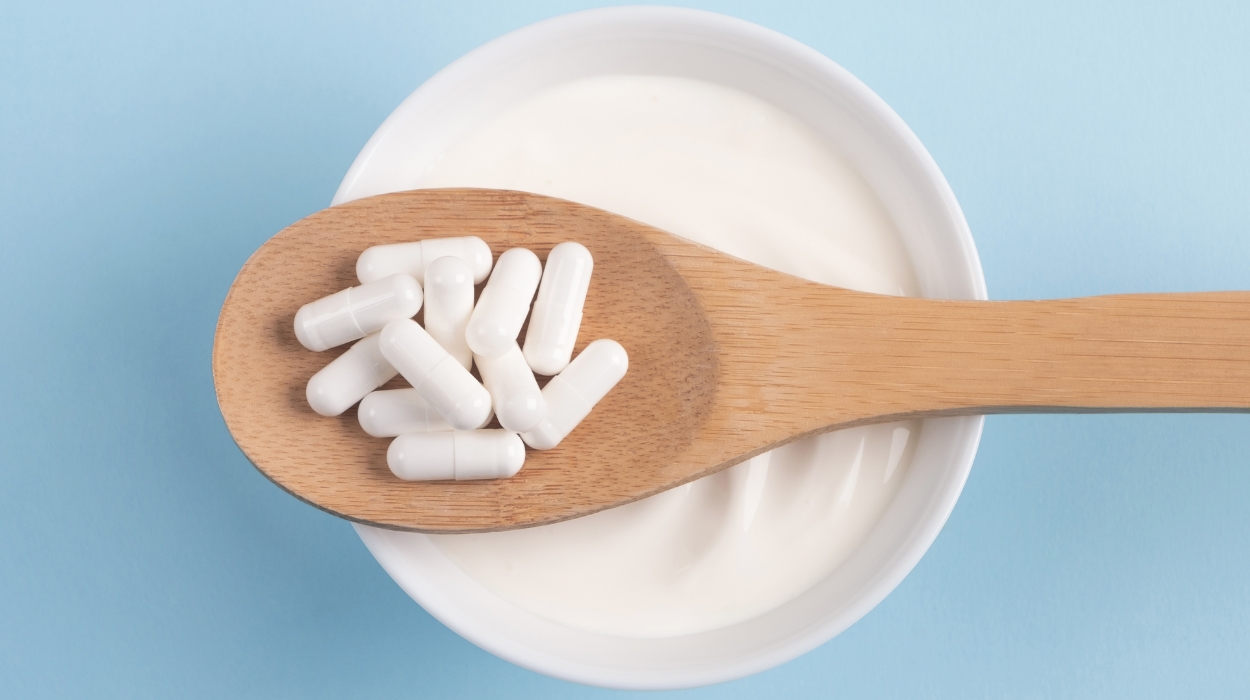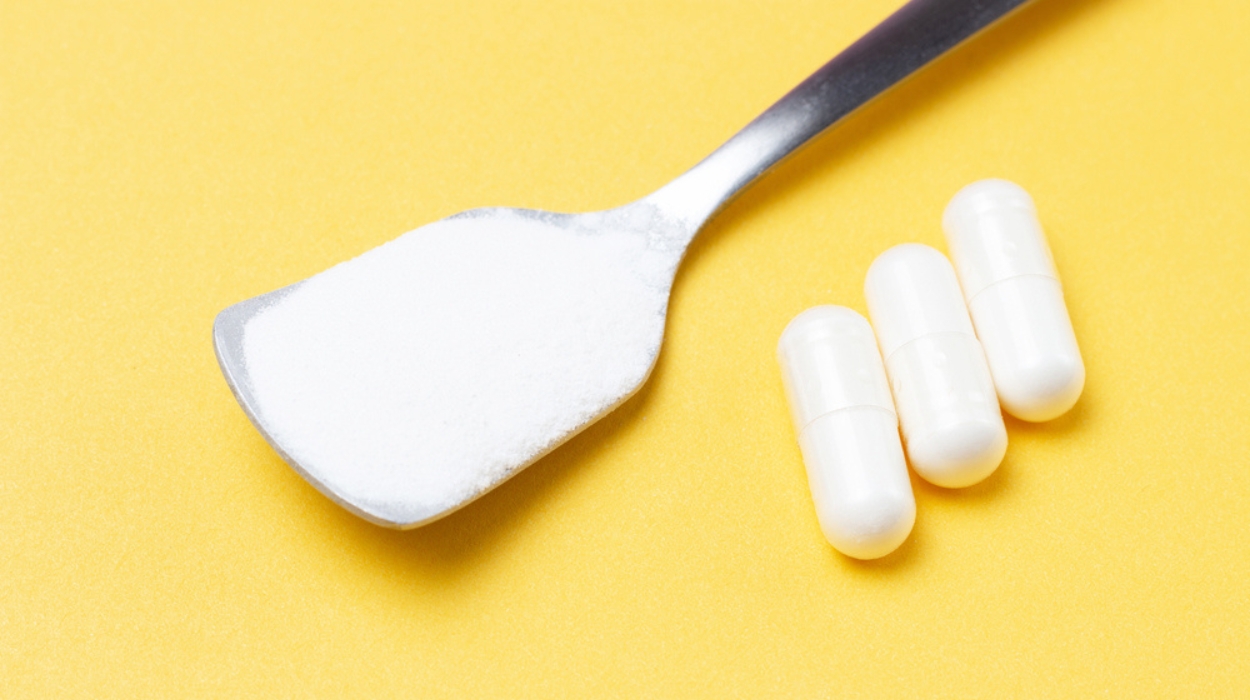If you have ever overindulged at your favorite restaurant, you might have experienced the familiar after-effects of bloating. But what happens if you experience bloating on a more consistent basis?
Gas and bloating are common symptoms of functional bowel disorders in the United States, predominantly irritable bowel syndrome[1] (IBS). Bloating can cause pain and discomfort and decrease quality of life.
There are many treatments purported to reduce bloating, but one of the most popular and effective treatments has been probiotics. Probiotics are live microorganisms known to improve gut health by promoting balanced gut bacteria.
So, do probiotics help with bloating? In this article, we will explore whether probiotics can help with your bloating, how they work, and discuss alternative treatment options to explore.
Do Probiotics Help With Stomach Bloating?
That depends on the underlying cause of a person’s bloating. If an individual is experiencing bloating as a byproduct of a gut microbiome dysbiosis, probiotics can help restore a healthy balance and relieve bloating. Certain strains of probiotics have been shown to be effective in reducing bloat such as Bacillus coagulans. On the other hand, probiotics may worsen symptoms of bloating in people with other gastrointestinal issues such as SIBO.
Do Probiotics Help With Bloating?
If you have ever wondered, “Why am I so gassy?” you have probably searched for an answer to your discomfort and stumbled upon the use of probiotics to battle bloat. But do probiotics help with gas and bloating? Well, it depends. The most crucial factor in determining if probiotics help with your gas and bloating is determining the underlying cause.
People may experience gas or bloating for several reasons.[2] Still, one of the leading causes is functional bowel disorders like irritable bowel syndrome, which may be due to a microbiome imbalance, immune system dysfunction, or a combination of social and psychological stressors.
A microbiome imbalance occurs when there is an imbalance[3] of good bacteria and bad bacteria in the gut. If the underlying cause of IBS is microbiome imbalance, studies[4] have shown that using probiotics can decrease bloat and gas symptoms.
If a microbiome imbalance is not the cause of your bloating, you likely will be left with continued symptoms, unless you uncover the other possible causes of gas and bloating such as food allergies or other gastrointestinal disorders.
How Do Probiotics Help With Bloating?

Have you ever wondered why does my stomach hurt when I wake up? As you sleep, your body enters into the parasympathetic branch of the nervous system, known as rest and digest mode, which leads to the digestion of food.
Bloating occurs when your stomach becomes full or distended due to excess gas in the digestive tract produced during the digestive process. Probiotics work by replenishing the beneficial bacteria in the digestive tract and reducing harmful bacteria that promote gas production. This restoration of balance in the gut microbiota results in a healthy digestive system, which will aid digestion and reduce digestive issues.
Certain probiotic supplements are more effective at reducing abdominal bloating. There has been research supporting the use of the following probiotic bacteria:
- Bifidobacterium lactis – Has been shown[5] to reduce bloating and distension.
- VSL#3 (Lactobacillus acidophilus, L. plantarum, L. casei, and L. delbrueckii ssp. bulgaricus, Bifidobacterium breve, B. longum, and B. infantis and Streptococcus salivarius ssp. Thermophilus) – Research[6] demonstrated these probiotic strains significantly decreased bloating.
- Lactobacillus acidophilus, L. plantarum, L. rhamnosus, Bifidobacterium breve, B. lactis, B. longum and Streptococcus thermophilus – Demonstrated[7] symptom relief of bloating.
- Bacillus coagulans – Observed[8] to reduce gas and distension.
Taking these specific probiotics can help restore the gut microbiome to a healthy balance, and reduce gas and bloating.
When Probiotics Might Not Help
Probiotics may fix the balance of bacteria in a person’s gastrointestinal tract, but if this imbalance is not the reason for your bloat, then you will continue to experience symptoms until you get to the root cause.
Other reasons a person may experience bloating include:
Food Intolerances
One of the most common food intolerances is lactose intolerance, which is characterized by a person’s inability to properly digest dairy products, such as milk, cheese, yogurt, or ice cream.
Research has shown that as a person ages, the amount of the enzyme lactase, which is responsible for breaking down the sugar lactase found in dairy products, drastically decreases or becomes nonexistent.
People often experience a lack of this enzyme after going through a gastrointestinal virus or infection, which can lead to lactose intolerance. Eating dairy products when lactose intolerant can lead to uncomfortable symptoms of bloat, gas, diarrhea, or constipation.
Food Allergies
If a person has a food allergy, this can cause bloating as the immune system reacts to the allergen in the digestive tract. Obtaining proper food allergy testing and eliminating these foods from the diet will reduce bloating in this population.
Low Stomach Acid
People who have low stomach acid may not properly digest foods. This can be due to certain medications, such as proton pump inhibitors. Low stomach acid levels can lead to undigested food sitting in the gastrointestinal tract, creating bloating and discomfort.
Other Gastrointestinal Disorders
These include Small Intestinal Bacterial Overgrowth (SIBO), Crohn’s disease, Ulcerative Colitis, or cancers of the gastrointestinal tract. SIBO occurs when there is too much bacteria in the small intestine that leads to the overproduction of gas causing abdominal discomfort.
Adding additional bacteria to the mix by taking probiotics can actually make symptoms worse. This is why it is crucial to discuss your symptoms with a healthcare provider before taking probiotics without an accurate evaluation and diagnosis.
Other Ways To Relieve Bloating
Although probiotics may help some individuals, they take time to produce results and aren’t practical for immediate relief. Additionally, if your cause for bloating is not from a microbiome imbalance, it is unlikely you will feel relief. Other natural remedies can help you debloat fast and get you back to living a pain-free life.
Ginger Tea
Ginger[9] tea is known for improving gut motility and is a potent anti-inflammatory. Stimulating digestion can relieve constipation and help move gas through the digestive tract, relieving symptoms quickly after consumption.
Yoga
Yoga[10] therapy has been shown to improve digestion and symptoms of gas and bloating. Certain positions stimulate digestion and help relieve stomach discomfort. Research[11] has shown that yoga, in combination with standard medical treatment in individuals with IBS, effectively reduces pain intensity associated with bloating.
Abdominal Massage
Abdominal massage is a great way to reduce abdominal pain associated with bloating and gas. Gently massaging the abdomen in a counterclockwise motion after meals is a common technique. Research[12] has shown that abdominal massage can relieve constipation and the associated symptoms of bloating.
Healthy Diet
Eating a healthy diet, particularly one low in fermentable oligosaccharides, disaccharides, monosaccharides, and polyols (FODMAPS), has been shown[13] to reduce symptoms of bloating. Improving dietary habits by starting on a low FODMAP diet will include[14] restricting certain foods such as dairy, wheat, beans, and lentils, and some vegetables, including asparagus, artichokes, garlic, and onions.
Conclusion
So, what is the final verdict? Do probiotics help with stomach bloating? If you are suffering from a gut microbiome imbalance, probiotics will help minimize symptoms.
On the other hand, if you are bloating due to food intolerances or allergies, low stomach acid, or other gastrointestinal disorders, you may have to try different natural remedies to find relief. Either way, treating bloating has many options to help reduce pain and symptoms and return you to a healthy, active lifestyle.
Frequently Asked Questions
Yes. Probiotics can help with belly bloat if the cause is an imbalance in gut flora.
Many different probiotic strains can help with bloating. The most studied include Bifidobacterium lactis, VSL#3 (a probiotic strain blend), and Bacillus coagulans.
Probiotics restore the balance of good and bad bacteria in the gut. Depending on the severity of this imbalance, this will take some time. Some people see results within a few weeks,[15] while others may take months to notice complete improvements.
Bloating can be caused by several digestive issues, including gut microbiota imbalance, low stomach acid, food allergies, food intolerances, and other gastrointestinal disorders. It is best to make an appointment with your healthcare provider to get to the root cause of your bloating so your doctor can properly treat it.
The 5 top bloating symptoms include feelings of fullness or distension, abdominal pain that can be sharp or stabbing, gurgling in the stomach, passing excessive amounts of gas, and burping. Other common symptoms include constipation and swelling.
 Expert's opinion
Expert's opinion

